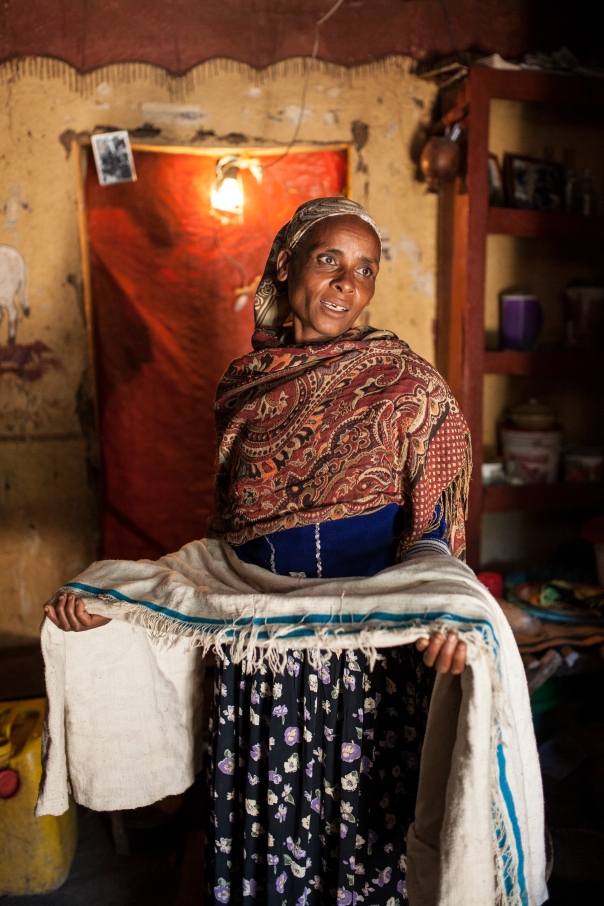Sometimes I just have a quick thought I feel is worth writing down. Tonight is one of those times.
There are three things wrong with the world.
Thinkers who do not do,
Doers who do not think,
And those who neither think, nor do.
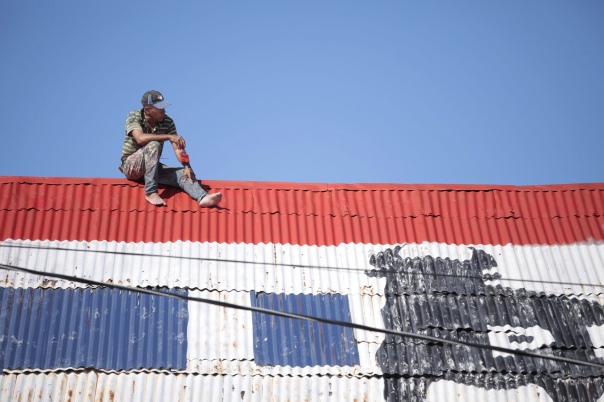
Sometimes I just have a quick thought I feel is worth writing down. Tonight is one of those times.
There are three things wrong with the world.
Thinkers who do not do,
Doers who do not think,
And those who neither think, nor do.

I’ve been back from Kibera for a week now. Though I was able to formulate a lot of my thoughts while still there, how to put them down was another matter.
I think I’m going to start with the premise that the largest deficit and therefore the largest detriment to missions coming from the Western world is a lack of humility. Without getting into too much detail, this is what we saw when we went into Kibera.
In Hebrews 1, we find that “God…has in these last days spoken to us by His Son, whom He has appointed heir of all things, through whom also He made the worlds; who being the brightness of His glory and the express image of His person, and upholding all things by the word of His power,”
In reading this we find that Jesus upholds all things. Yes, I know there is still sin in the world, and that is why God’s Kingdom is both here and coming at the same time. But when we realize this fact, what we discover is that no matter where we go, God is already there working. Frequently as missionaries it is not so much our job to come in with a new plan, but rather to walk into a place prayerfully with our eyes and ears wide open to discover what it is that God is already doing. It takes an awful lot of hubris to think that God isn’t there until you show up.
If we don’t do this, we find what we unfortunately did when we went into Kibera, and is summed up in the book, “When Helping Hurts”, by Steve Corbett and Brian Fikkert. It reads, ““The god-complexes of the materially non-poor are also a direct extension of the modern worldview. In a universe without God, the heroes are those who are best able to use their reason to master the material world. In other words, the materially non-poor are the victors in the modern worldview, the gods who have mastered the universe and who can use their superior intelligence and the material possessions they have produced to save mere mortals, namely the materially poor.”
When we go into a poor community thinking we know it all, we are ultimately going to do damage. Western missionaries had come in and put a plan together without consulting the indigenous leadership, then pulled the funding they had been giving when they didn’t go along with it. Their plan was to pull everyone out of Kibera to a place where they felt they could more easily sustain themselves. Though this sounds like a good plan on the surface, it did not take into account the vision and mission that the people living there already had; that being to reach the community around them. They were being asked to abandon their own countrymen who needed them. Imagine what Africa would look like if Western missionaries came into every community and removed the leadership. If you want to see REAL poverty and suffering, that’s the way to do it in short order.
Summing up, we need to be very careful when we come into indigenous communities with our grand plans. Often they are just that…. ours.
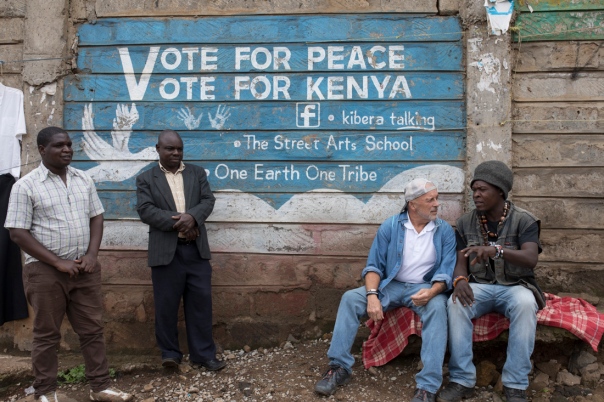
In just a couple of weeks, I head back to Kibera, Kenya. A group of four men will be going to minister in the largest urban slum in Africa. We’ll be going back to catch up with some good friends we haven’t seen in a long time.
It occurred to me today that I used to post a lot more pictures than I have been lately. I am a professional photographer, after all. So for those following my journey, here are some pictures from previous trips to see Pastor Obedi and His wife Helen in Kibera.
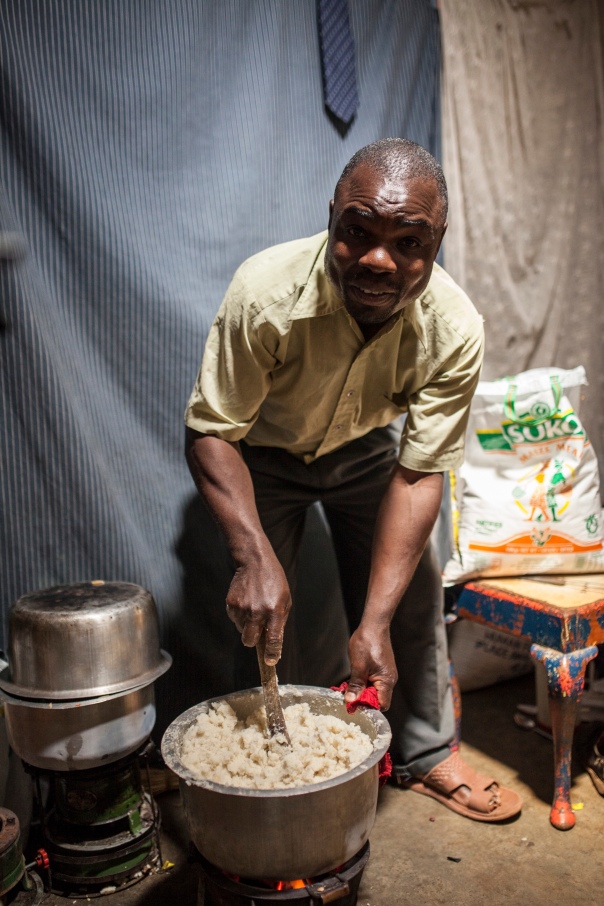











In less than three weeks I leave for Kenya. This will be my first trip to Kenya in about three and a half years. There will be a team of four of us going, two of which have never been to Kenya before. It’s hard to convey to people who have not been there not only what it will be like, but also what we’ll be doing there. It’s the second part, the what we will be doing, that I’d like to talk about today.
I think the best way to start explaining what we are going for is to use the Apostle Paul’s fifth missionary journey as a template. You say you haven’t heard of Paul’s fifth journey? Well, it’s not nearly as well known as his first four. It’s the one where Paul took a group of people to Tarshish, and they painted the walls of a church that didn’t need painting. After that they did some street preaching in a language no one understood, and then handed out flip flops and used shoes. After that, on the last day they went shopping and snorkeling.
This of course did not happen. And I realize that my sarcasm is biting. But I also know that when people read something that is true, the initial reaction is to be angry, but then to think about it. There is nothing wrong with going somewhere to do projects that need to be done, and there’s nothing wrong with having some fun on the last day you’re there. What I find distasteful is that short term missions has gone from an opportunity to build unity within the body of Christ, and to both be a witness to the lost and encourage and strengthen our indigenous brothers and sisters to do the same, and instead has become wholly about us. What is the project? What are we going to paint? What are we going to build? What are we going to do TO or FOR these poor people? The moment we ask these questions we put ourselves on a higher plane in our own minds than those we are going to minister to. There’s a song with the phrase, “the notion that we’re better than them; the ultimate delusional chant.”
Instead, we ought to ask things like, How can we work together so that we can all grow in better community with each other and with God? How can we learn from each other so we will not continue to walk in our own brokenness? When we ask these questions, it suddenly becomes less about projects, and it becomes a lot more about people.
So going back to what we’ll be doing in Kibera, I think it would be best to start with a description of what Kibera is.
Kibera is the largest urban slum in Africa. It’s population is unknown, though estimates range between 250,000 and a million people. The average family lives in a 12 foot by 12 foot shack. There is no trash pick up, and there are no sewers, so sewage runs down every gully and low point of ground. The average wage is $1 a day. Crime and violence are rampant.
In light of this, going in and painting something or doing some kind of project, or even feeding the poor would be the equivalent of putting a bandage on a dead beached whale. The truth is, a large number of the people there are either unemployed or sporadically employed. So if I go in with a team and start working on something that needs to be “improved”, all I’m doing is depriving someone of a paying job.
So what can we do? This is where the “working with” as opposed to the “doing for” is so important. You find the indigenous resources and skills that are already there and figure out how they can be developed with the help of the people who live there every day. You identify community leaders, like pastors, who already have the respect of the people. You find out what their own goals and vision for their community are and do what you can to achieve that. When there is a specific deficit, and only when there is a specific deficit that can’t be filled from within the community do you bring in foreign money and talent.
This doesn’t sound nearly as romantic as saying, “we went to Kenya and fed 1000 poor children”. And this is the reason that I decided to write this blog. One of our new people lamented that when he told people what we were doing, he had a hard time raising support. The response was, “So basically you’re going to Kenya to have a bunch of meetings with people?”
The answer was essentially yes. But we have to go and do what’s ultimately right, and not what makes people feel good about giving. After all, it really isn’t about us.

In about six weeks I’ll be going back to Kenya, and as usual God has been speaking to me about His Kingdom. Last week He revealed something to me that broke my heart; something about the western Church and about myself as well. I wanted to break this up into a couple blogs, but I don’t think that’s going to be possible, so I apologize in advance for the length.
This will be my thirteenth trip to Africa in the last eight years. When you go somewhere outside of your own culture, there are certain things that become impossible to miss. One of those is how closely the African Church, at least as far as I’ve seen it, mirrors the church in Acts, and conversely, how poorly the western church mirrors the early Church.
As Jesus was just about to go up to Heaven, he gave instructions. “Go into all the world and preach the gospel to every creature. He who believes and is baptized will be saved; but he who does not believe will be condemned. And these signs will follow those who believe: In My name they will cast out demons; they will speak with new tongues; they will take up serpents; and if they drink anything deadly, it will by no means hurt them; they will lay hands on the sick, and they will recover.” (Mark 16)
Largely this is what I see in Africa. I see the sight of the blind restored, the sick healed, the insane restored and their entire lives changed, addicts recover. I see people pray for what we would consider crazy and God answers it, and the list goes on, reflecting what Jesus said would happen as signs that would happen after the gospel is preached.
While I see some of that in America, I don’t see nearly as much of it. So why would that be? Well, that was what God spoke to me about.
There are a number of gifts of the Spirit of God that are listed in the bible, besides the signs that Jesus mentioned in Mark. There’s a somewhat comprehensive list of the more common ones in 1 Corinthians 12.
“There are diversities of gifts, but the same Spirit. There are differences of ministries, but the same Lord. And there are diversities of activities, but it is the same God who works [e]all in all. But the manifestation of the Spirit is given to each one for the profit of all: for to one is given the word of wisdom through the Spirit, to another the word of knowledge through the same Spirit, to another faith by the same Spirit, to another gifts of healings by the same Spirit, to another the working of miracles, to another prophecy, to another discerning of spirits, to another different kinds of tongues, to another the interpretation of tongues. But one and the same Spirit works all these things, distributing to each one individually as He wills.”
There are largely two lines of thought on this in the west. Those who think that the gifts of the Spirit mentioned above are to be sought above all other things, and those who don’t think they exist anymore. So how do we get such polar opposite views in a supposedly singular Church? Well the answer to that question is where we went wrong, and where the African church can save us, because we’ve gone way off course.
I’m going to start with those who seek the gifts over all things. There are churches that will tell you that if you do not speak in tongues then you are not saved, or other similar statements about the gifts of the Spirit. But what are the gifts? If you look at what they are and how they are used, they not only display the glory of God, but more importantly they display the love of God to a lost world. It is no mistake that the next chapter in 1 Corinthians after the one about the gifts is the chapter about love, summed up in the verse, “And though I have the gift of prophecy, and understand all mysteries and all knowledge, and though I have all faith, so that I could remove mountains, but have not love, I am nothing.”
If we seek the gifts of the Spirit but do not love our neighbor, we only seek to perform spiritual parlor tricks. If we do not love our neighbor, who was created in God’s image, then we do not represent the God who created them.
The other side of the coin is those who say that the gifts of the Spirit died with the apostles, and that God no longer does these things today. Dispensationalism is the name for this doctrine for anyone that cares. I’ve heard prominent pastors engage in spiritual contortions in order to make this work in their own minds, going so far as to forbid these gifts. (How you can forbid something that supposedly doesn’t exist, I don’t know, but that’s beside the point.)
Here’s the problem; When those gifts start showing up, who am I going to believe, your preaching or my own lying eyes? Faith is the evidence of things unseen, but when God shows up in powerful ways and we still don’t believe it, that’s something straight out of hell.
But when we don’t see God show up in the ways He said He would, it’s easier to build a doctrine around how God has changed and not have to face the fact that we were unfaithful. You see, if we were faithful to love our neighbors as ourselves, as we were commanded to do; if we were to give of ourselves sacrificially to the poor and the lost, then the gifts of the Spirit would show up as a matter of course. If on the other hand we seek the gifts without doing what Christ commanded, then we are guilty of idolatry, worshipping the gifts rather than the giver.
So boiling it down, and this is going to make people mad, but so be it; the African church loves the lost, and we don’t. We don’t love the lost every time we turn a blind eye to the poor, every time we refer to immigrants as filthy criminals, every time we judge the addict because they “made bad choices and they’re just reaping what they sow. Shall I go on?
How do the Africans love their neighbors? By blessing people and praying the love of God over people even as they’re being beaten, by exercising gifts of healing over the son of someone who tried to burn down his house, by giving sacrificially to the needy, even in their own poverty. This is what the Church was created for.
As Jesus said when he started his ministry,
“The Spirit of the Lord is on me,
because he has anointed me
to proclaim good news to the poor.
He has sent me to proclaim freedom for the prisoners
and recovery of sight for the blind,
to set the oppressed free,
to proclaim the year of the Lord’s favor.”
Then he rolled up the scroll, gave it back to the attendant and sat down. The eyes of everyone in the synagogue were fastened on him. 21 He began by saying to them, “Today this scripture is fulfilled in your hearing.”
We’ve, no, I’ve got so much I have to learn.
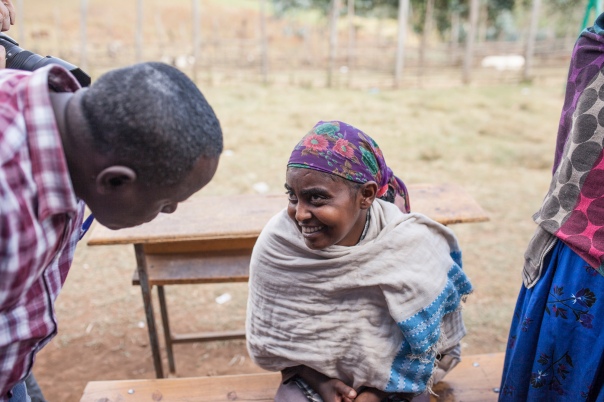
Photo of the woman who’s sight was restored after two years of blindness in Ethiopia.
It’s been a year now since I was in Africa, and next week I go back. Once again, I’ll be going to Ethiopia. I’ll be taking my camera, not to show pictures of miserable children and flies as some like to do, but to capture a realistic picture of life; to bring awareness not only of the struggles but also the triumphs that people have on a daily basis. My goal is to capture the heart of the people and communicate what commonalities tie us all together on both sides of the ocean. I’m looking forward to seeing old friends, both from Ethiopia and North America.
I’ll be traveling to two different regions, one of which I have not yet been to. I will try to keep blog posts going as I travel, though internet is not always a possibility, so there may be gaps. I may not be able to be specific about where I am at times for various reasons, but I will be traveling to the East and the South. It’s been five years since I was in South Sudan, and the southern region I’m going to will be the closest I’ve been to that country since then. I’m curious to see how the two regions compare, so in that spirit, I’m posting pictures from South Sudan today. We’ll see if there are any similarities when I get to Southern Ethiopia. Until next time, please enjoy the photos.
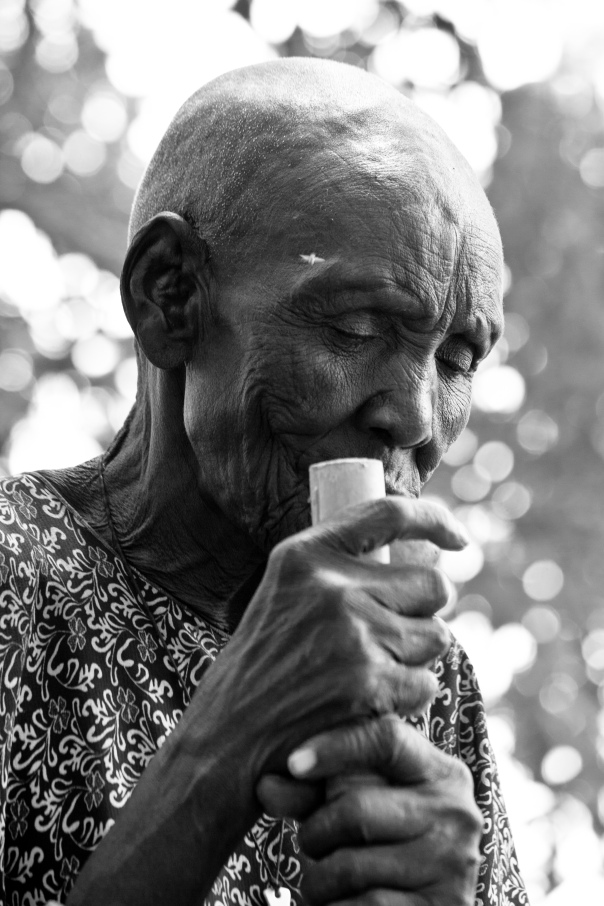
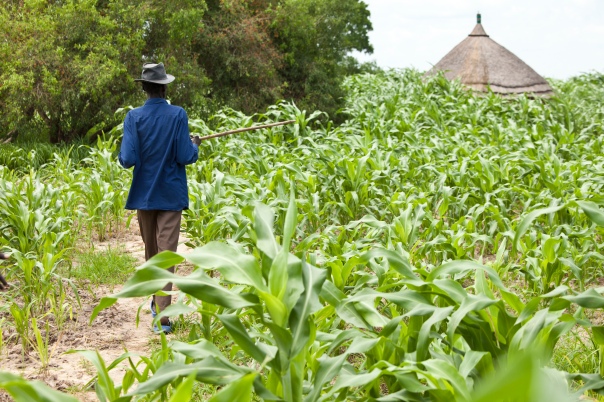
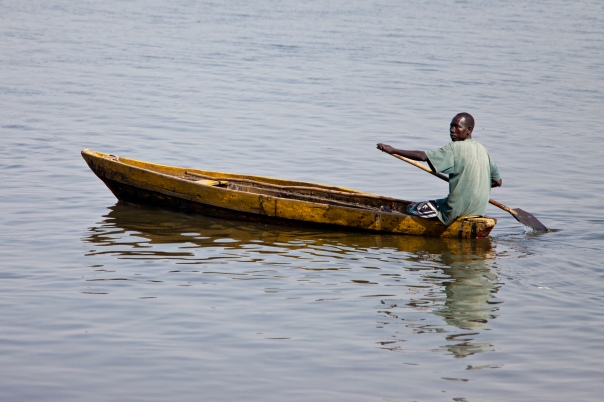
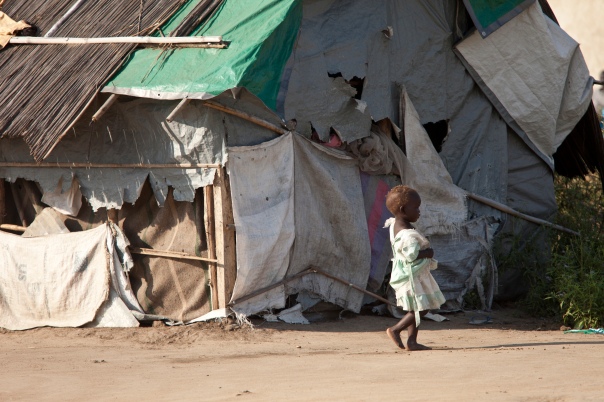
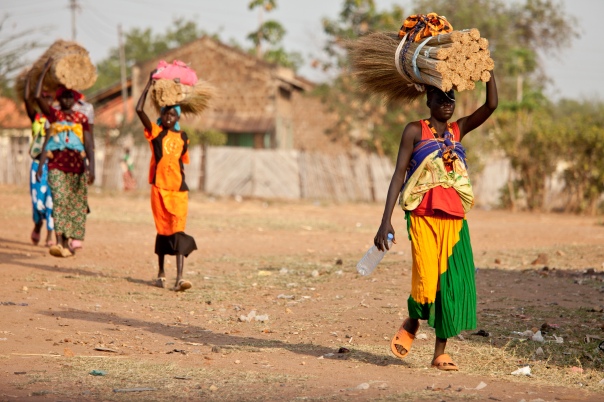

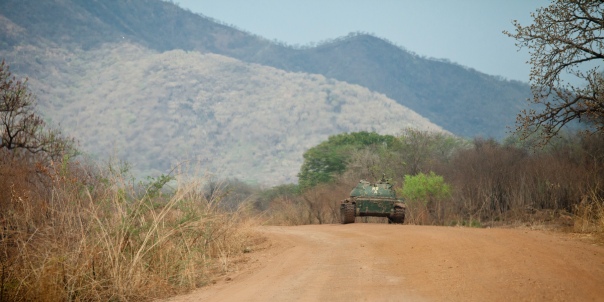

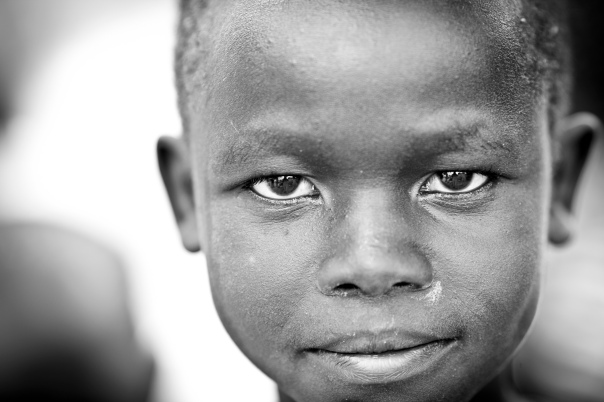
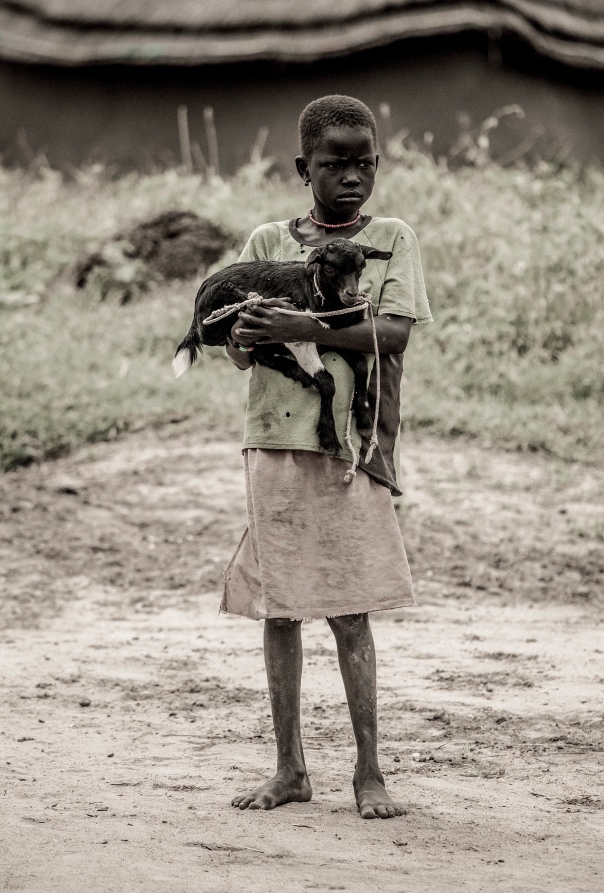
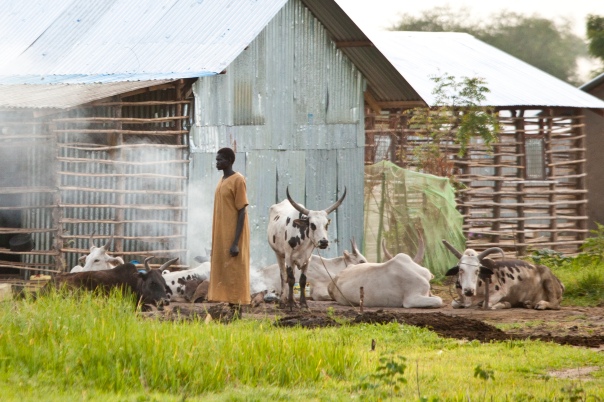
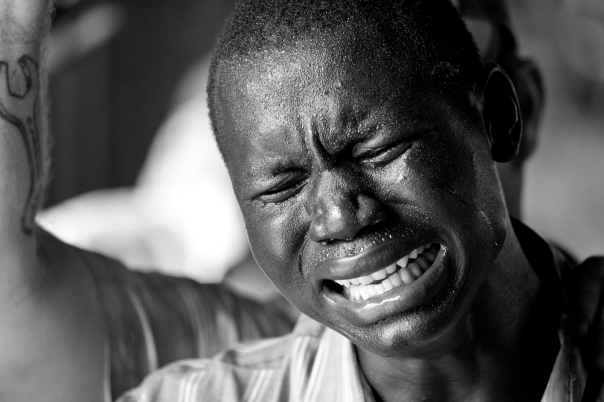
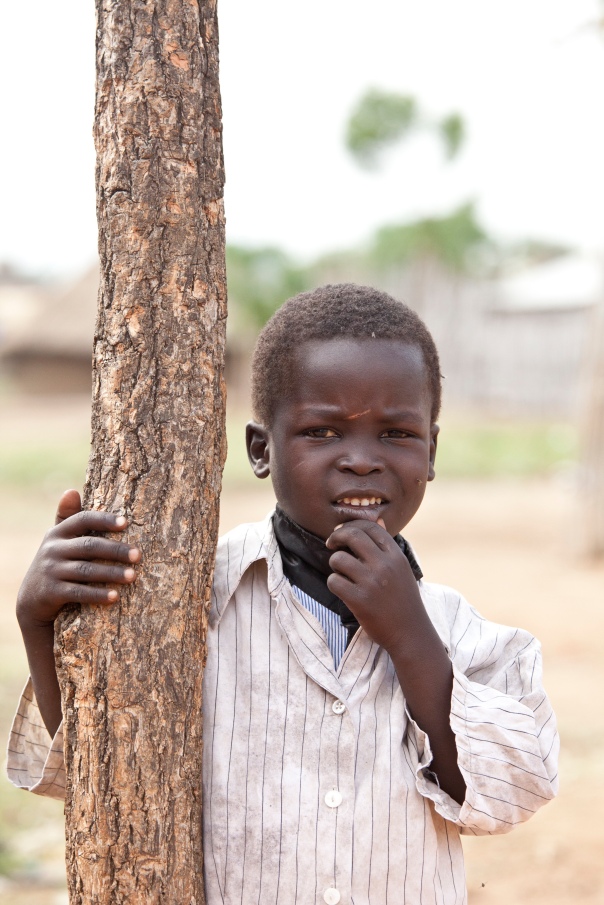
It’s been about six months since I’ve written. During that time, there have been a lot of distractions and tragedies, including the death of the man who’s been my father for the past 32 years. I’m sure I’ll write about that at some point, but in the meantime, I’m starting to write things down that have been on my mind for a long time. This is in preparation for going back to Ethiopia after a hiatus of a year.
Many people know the story of Lazarus. For those who don’t, he was a friend of Jesus. He was also either a friend or relative of Mary and Martha, who played a prominent role in the gospels. Mary and Martha called for Jesus when Lazarus became ill, but Jesus did not return for several days. In the meantime, Lazarus died. Jesus eventually came back, but in that time Lazarus had already been buried. All of this can be found in the book of John chapter 11. The end of the story goes like this,
” Jesus, once more deeply moved, came to the tomb. It was a cave with a stone laid across the entrance. “Take away the stone,” he said.
“But, Lord,” said Martha, the sister of the dead man, “by this time there is a bad odor, for he has been there four days.”
Then Jesus said, “Did I not tell you that if you believe, you will see the glory of God?”
So they took away the stone. Then Jesus looked up and said, “Father, I thank you that you have heard me. I knew that you always hear me, but I said this for the benefit of the people standing here, that they may believe that you sent me.”
When he had said this, Jesus called in a loud voice, “Lazarus, come out!” The dead man came out, his hands and feet wrapped with strips of linen, and a cloth around his face.
Jesus said to them, “Take off the grave clothes and let him go.”
And as abruptly as that, the story ends. It’s a great story. I mean, Jesus raises someone from the dead. What more do you want, except maybe, what happened to Lazarus after that? I’ve never heard anyone ask that question before.
I can tell you what didn’t happen to Lazarus. He didn’t walk out of the tomb and get hit and killed by a pie truck. What on earth do I mean by that, you might ask?
What I mean by that is twofold. First of all, if you get raised from the dead, clearly God has a purpose for you. You don’t walk out of the tomb, everyone says “great trick”, and you die. You have some task that God has for you to accomplish.
The second thing is that whether he wanted to or not, no one would ever look at Lazarus the same again. No matter who he was or became, or what he accomplished, Lazarus would be known as the man who was raised from the dead.
There’s a 1980’s comedy film called Weekend At Bernie’s in which two people are invited to their boss’s vacation home for the weekend only to discover him dead. They are determined to have fun anyway, so they spend the whole weekend having fun but convincing everyone that their boss Bernie is still alive.
What does that have to do with Lazarus? Well, the only place where I can find Lazarus mentioned again is in the next chapter, John 12.
“Six days before the Passover, Jesus came to Bethany, where Lazarus lived, whom Jesus had raised from the dead. Here a dinner was given in Jesus’ honor. Martha served, while Lazarus was among those reclining at the table with him.
Meanwhile a large crowd of Jews found out that Jesus was there and came, not only because of him but also to see Lazarus, whom he had raised from the dead. So the chief priests made plans to kill Lazarus as well, for on account of him many of the Jews were going over to Jesus and believing in him.”
My point is this. Once Lazarus was raised from the dead, his very presence, just the fact that he was alive, proverbially shouted from the rooftops that Jesus was the savior and was God. People came just to see if Lazarus was in fact alive, or if perhaps was just propped up in the corner Bernie style. People were curious if it was possible, if in fact the dead could be raised.
Which comes to us. If we have been saved in Christ, then we too have been raised from the dead. The old man has been killed and we are now alive in Christ. And if that is true, then we have been given a purpose, that is to say, we should live for what we were saved for. Furthermore, we should ask ourselves if the life we live is truly a life in which, by the hand of God we’ve been made alive, or are we just a body propped up in the corner trying badly to convince others that we are in fact alive? For me, I want to be so alive that the forces of evil plot to kill me all over again.
In about a month, I go back to Ethiopia for the first time in a year. Each time I have to raise my own funds. I pay for a significant portion of it myself, but I still need to raise additional funds to fill in the shortfall. Some, like myself, are blessed to be able to go. Some can not, but all can play a role in one way or another. If my work is important to you please consider both praying for our team and giving financially. I’ve included a link here with a synopsis of my trip as well as a link to give. Thanks so much to those who have been a part of the sending team in the past in whatever role you’ve played, and to those who will in the future. https://petrosnetwork.managedmissions.com/MyTrip/johnwollwerth1
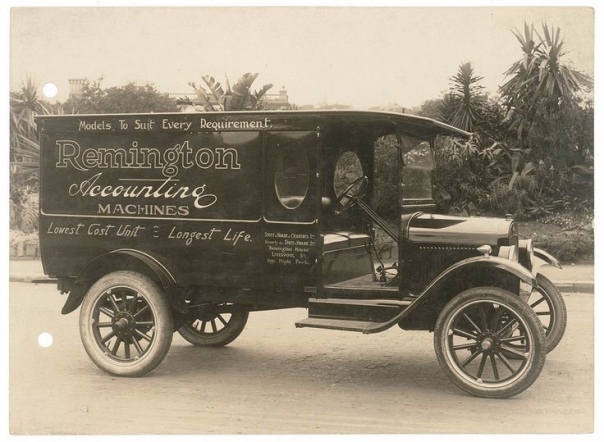
Recently I was looking at a group I follow on Instagram. It’s an organization that puts together short term missions trips for which people can get involved. They put up a map showing all of the planned trips for the year. There were a lot of them, and they were certainly going to be very busy. But one thing stood out immediately, and that was the blank parts of the map, places where there were no trips planned. The entire Middle-East was missing. North and Central Africa were missing. Central Asia was missing. In short, the planned trips were all to places where the gospel has already been heavily preached. All or nearly all where there is a significantly large indigenous church presence to take up the job for which we’re sending short term missionaries.
Even in the first century, the Apostle Paul talked about this. Romans 15:20 says, “It has always been my ambition to preach the gospel where Christ was not known, so that I would not be building on someone else’s foundation.”
The problem is this; when Jesus told us to go and make disciples of all nations, going to Jerusalem and Judea and Samaria, and to the uttermost parts of the Earth, we weren’t all supposed to go to the same place. God was looking for pioneers. He was looking for people who would do the hard work, going into hostile, uncomfortable places. That’s what pioneers do. But at some point the settlers came in. Settlers are people who see that the wolves have been killed, the land has been cleared, and the railroad has been constructed. Settlers want to do something worthwhile but don’t like risk. In short, settlers build on someone else’s work. They not only settle the land, they settle for second best.
What we have to realize is that the Great Commission was never about us. It was not about feeling like we’re doing something worthwhile. It was not about being or looking busy, or having a life-changing experience. Sometimes these things happen. It’s good to have a life-changing experience and have a heart change. But it’s more important to be obedient. When Jesus said to go to the uttermost parts of the Earth, he meant the uttermost parts, and not just the convenient and easily accessible parts of Mexico. When we go to these places, we often go to places where we are not needed, and local ministries often find themselves taken from critical work in their own communities to accommodate our insatiable need to feel like we got something done. In cases like this, it’s better to have just stayed home. I don’t want to sound harsh, but the more quickly we figure out that missions is not about us, the more quickly we can fulfill the actual commission we were given.
So the next time an opportunity comes up to get involved in missions, ask yourself, “Am I a pioneer or a settler? Am I doing the best God has called me to, or am I settling for second best?”
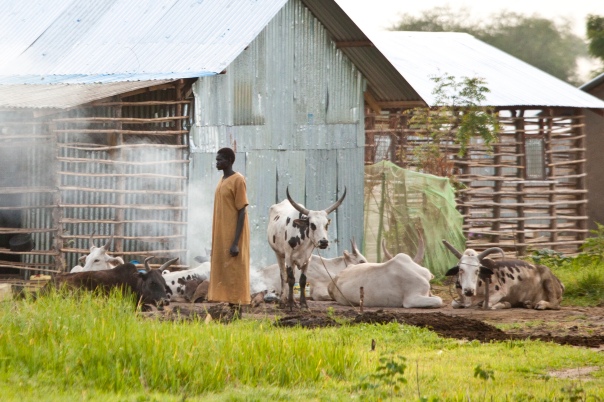
The past week or so, I’ve been thinking a lot about the harder aspects of some of the things I’ve seen over the past several years. I’ve been thinking about things like poverty and setting the captives free. I’ve been particularly thinking about why some people and some cultures have been successful at dealing with theses things and why some have gone down tragic roads, when from the outside it looked like many of them had similar origins.
These are particularly hard subjects to understand for the western mind, because we live in a culture where we get most of our information about poverty and oppression from movies and a media that sees these subjects as sufficiently distant from personal experience to understand them in the kind of visceral way that people in South Sudan or the Congo would.
We believe in a number of things that, though possibly politically correct, when tested turn out to be factually false. We believe things like; poverty is mostly a problem of lack of resources, or that all oppressed people are naturally angelic, or that if people could just have oppression removed they would thrive. We believe these things because they are the subject of so many feel good stories. I would like to believe them to, but my experiences in parts of Africa have taught me that even though these things can happen, life is usually far more complicated and usually much messier than this.
My time in South Sudan was a huge eye opener for me. The South Sudanese were oppressed horribly by the Northern Sudanese for decades, in ways that for brevity I’m not going to get into. I first went to South Sudan in 2010, right before they achieved independence from the North. I saw the hope and the excitement on people’s faces as they prepared for the vote that would free them from their oppressors. Surely this was the Hollywood story everyone wanted and expected to see. Not quite.
Over the next three years, I went back three more times, and got to personally see the situation devolve into chaos. The South Sudanese went from fighting against the Northern oppressors to fighting against each other. If you’d like to read more about that, you can go back into some of my blog posts from 2013 and 2014 particularly. So what happened?
To say I can explain all of the aspects of this in a single blog post would be naive and foolish, because it’s an incredibly complex subject, and entire books could be written about it. So I’m going to focus on just a small part.
I want to start by drawing some parallels between the situation in South Sudan and the written account we have of another oppressed culture that was freed from its captors around 3400 years ago. I’m speaking of the exodus of the Israelites from Egypt as written in the book of Exodus. There are many things written that can give us insight into the kind of things that happen when an enslaved culture is freed, particularly if you know what you’re looking for. The great thing about Exodus is that is quite comprehensive, and conveys a complete timeline.
One of the things that many Westerners don’t have a grasp of is the mental, emotional, cultural, and spiritual damage that is caused by institutionalized oppression, particularly slavery. This can manifest in people as hopelessness, a feeling of powerlessness, depression, and sometimes even paranoia. The end result is that when an opportunity comes for people to be free, they often don’t take it. Oppressed people often choose the miserable security of keeping your head down and staying alive than taking a chance at freedom. This is evident in Exodus 6:9. Moses is interceding on behalf of his people, and he goes to give them instruction. Their response is in Exodus 6:9. “So Moses spoke thus to the children of Israel; but they did not heed Moses, because of anguish of spirit and cruel bondage.”
Later on there are a series of events that happen that as I read them, made me initially think about these parallels. The Israelites have been set free and are crossing the desert when it dawns on the Egyptians that they’ve lost their free labor. The Egyptians send out their army to retake the Israelites. As the cloud of dust rises on the horizon from the Egyptian army, there is a record of what the Israelites say, and it is surprisingly fatalistic and even has a hint of longing for the land in which they were enslaved.
Exodus 14:11 Then they said to Moses, “Because there were no graves in Egypt, have you taken us away to die in the wilderness? Why have you so dealt with us, to bring us up out of Egypt?
Exodus 14:12 Is this not the word that we told you in Egypt, saying, ‘Let us alone that we may serve the Egyptians’? For it would have been better for us to serve the Egyptians than that we should die in the wilderness.”
And in another situation, later on, Exodus 16:3, And the children of Israel said to them, “Oh, that we had died by the hand of the Lord in the land of Egypt, when we sat by the pots of meat and when we ate bread to the full! For you have brought us out into this wilderness to kill this whole assembly with hunger.”
Their response is puzzling until you realize one thing, and this is the key. Moses interceded on the Israelites behalf because it was God’s will that they should be freed. For many of the Israelites, they were content with the security of the situation, miserable as it was. After God sent the plagues, the Israelites became a stench in the nostrils of Pharaoh, and there was no longer a choice to stay. This is why it’s so important when we’re working with oppressed people to allow them ways to empower themselves. Many of the Israelites were not so much liberated as evicted from Egypt, and it’s when we realize this that their responses suddenly make sense. The Israelites continue to act like slaves even though they are physically free people for the next forty years. Moses was able to take the Israelites out of slavery, but he was unable to remove the slave from the Israelites. In fact, it is not until the next generation grew up, a generation that never knew what it was like to be a slave, that they are able to enter the promised land, because you can not build a nation with people that are still slaves in their heart.
This is what I found in South Sudan. A nation that knew nothing but oppression and slavery and warfare, and doing what each person needs to do to survive on a daily basis, has walked into freedom with the same attitude. Whereas the common enemy used to be the North, now the common enemy is every man’s neighbor. No one has a plan for the future, because people are still living to survive the current moment. I understand that it is hard to change an entire way of thinking and living, but I hope and pray that the South Sudanese don’t have to wander in the desert for forty years until a generation is raised up that know how to live in freedom.
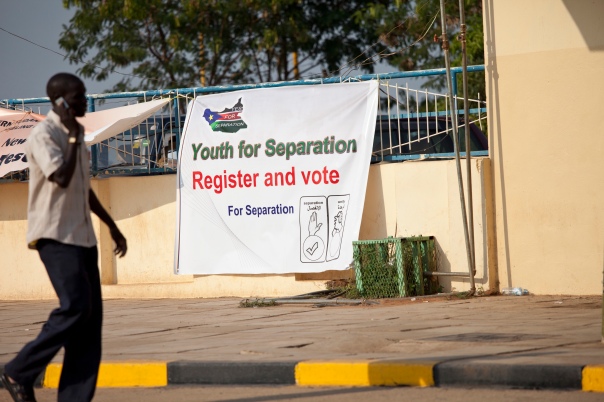
As is my tradition, before I take a trip overseas, I write a test blog from my iPad. The interface is a bit different on a mobile device than on a computer, so I like to write at least one blog from the iPad to work out any kinks while I have access to power and bandwidth.
Saturday I leave for Ethiopia. This is also the time when a hurricane is predicted to be passing through, but we will pray against that. If Jesus commanded the wind and the waves, and we are acting in his authority, then so can we.
We are traveling to Ethiopia to do the finishing work on the Tesfa Center, which is a center designed to give destitute widows in the rural countryside a place to work and sustainably support both themselves and their children. James 1:27 came to mind today. It says, “Pure and undefiled religion before God is this: to look after widows and orphans in their distress and to keep oneself unspotted by the world.” We have been given the awesome opportunity to do this. Notice that is not enough to be unspotted by the world? There are also things that must be done. Likewise we are not just called to be busy. Faith without works is dead, just as works without faith will not save us. By faith we show gratitude to the God that selflessly gave himself for us, that while we were yet sinners he died for us. We in turn should live as ransomed people. As God gave his life for us, we return it by giving ours back.
So long as I have internet I plan to give updates while I’m gone. Finally, I leave you with a picture of one of the widows we are going to minister to.
